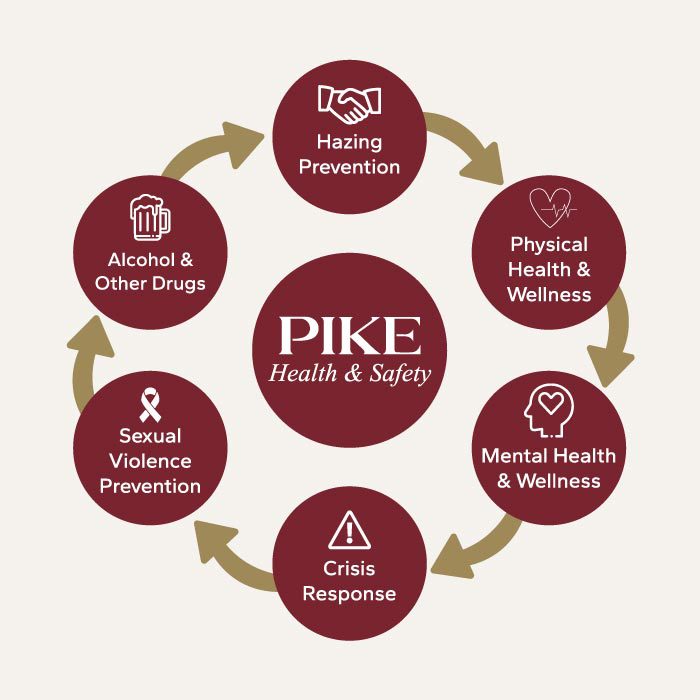 Above all else, Pi Kappa Alpha cares about the health and safety of our members and guests.
Above all else, Pi Kappa Alpha cares about the health and safety of our members and guests.
What is PIKE Health & Safety? Our goal is for all members to identify and act upon shared responsibility. Members must acknowledge their critical role in protecting their own and other students’ health and safety. It is important that members learn to choose for themselves and to bear the consequences of their decisions, but these choices must be guided.
Expectations. Interventions. Accountability.
The PIKE Health & Safety initiative provides a comprehensive and holistic approach to chapter operations by focusing on:
- Expectations: Defining the expectations of membership in the Fraternity including those defined in Fraternity Standards, Codes and Constitution, Chapter Bylaws, as well in the Ritual and values of Pi Kappa Alpha.
- Intervention: Develop systems and protocols that make it easy for brothers and guests to meet expectations in an environment where Health & Safety is every brother’s responsibility.
- Accountability: Hold each other to the Standards of Pi Kappa Alpha, the expectations of brotherhood and be willing to take an active role in addressing undesired behavior.
The Fraternity Standards:
Each chapter and provisional chapter of Pi Kappa Alpha shall maintain as a condition of its charter to remain in good standing with the Fraternity, or as a prerequisite for a provisional chapter to obtain its charter.
The chapter’s health & safety officer is typically responsible for educating members on various policies and expectations, including the Standards. Chapter officers must work together to see that these standards are implemented at every level of operations, with a particular emphasis on event management procedures and risk mitigation efforts.
This duty is not an easy one. It will take a great deal of leadership and skill; but most of all, it will take teamwork. Take the time to educate membership on why such plans are necessary, and most importantly, be prepared to effectively communicate the importance of following all Fraternity expectations. Whether the forum is an executive council meeting, chapter meeting or an informal setting, it is important to give no ground in the fight for effective health and safety practices.
Education & Training for Chapters:
To fully integrate Health & Safety into chapter operations, chapters typically assign or elect a Health & Safety officer and develop and execute a continuing education program. This program typically includes educational dialogues regarding specific health & safety related topics, an annual review of their written health & safety operations guides, the development of a crisis response plan, the establishment of a chapter judicial board, and engagement in offerings from the Fraternity.
Access Health & Safety Resources through myPIKE >
Parent Resources
Your son is embarking on a great new chapter as a Pike, but you might have some questions. PIKE Health and Safety helps to develop ethical decision-making by providing strategies for healthy personal relationships and organizational behavior.

